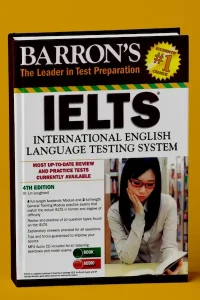Barron’s IELTS 4th (pdf+ Audio)
Barron’s IELTS 4th Edition is a smart way to get better scores in the Test of English as a foreign language. This book has been designed to help you on the IELTS task 2 part on writing a letter or a report. If you need a textbook that can save your time for looking for other sources in preparation for the test, you are in the right place.
USING THIS BOOK
You can study the material in this book in many ways. You can study it in a class; you can study it by yourself starting with the first page and going all the way to the end, or you can study only those parts where you know you need extra help. Here are some suggestions for getting the most out of Barron’s IELTS.
- Look over the Table of Contents so you have an idea of what is in the book.
- Take a Model Test so you understand where you need more help.
- Become familiar with the directions for IELTS. Get to know what the task is. This will help you move quickly through the test.
- Study efficiently. If you don’t have much time, only study where you need extra help.
- Use the strategies. These strategies will help you score well on IELTS.
- Use the explanatory answers. These answers will explain why an answer choice is wrong. For many of the items, the answers will only be approximate. Your answer need not match the one provided as a sample.
- Study a little every day. Don’t fall behind. Keep at it.
CONTENTS
Here is the content list of Barron’s IELTS 4th Edition:
1 Introduction 1
Using This Book 3
Questions and Answers About IELTS 4
2 Preparing for IELTS 9
A Study Contract 9
Exam Day Tips 13
3 Listening Module 15
Quick Study 16
Overview 16
Question Types 16
Listening Tips 17
Completing the Blanks 18
Listening Skills 24
Skill 1—Making Assumptions 24
Skill 2—Understanding Numbers 30
Skill 3—Understanding the Alphabet 32
Skill 4—Distinguishing Similar Sounds 34
Skill 5—Listening for Descriptions 36
Skill 6—Listening for Time 38
Skill 7—Listening for Frequency 43
Skill 8—Listening for Similar Meanings 44
Skill 9—Listening for Emotions 45
Skill 10—Listening for an Explanation 47
Skill 11—Listening for Classifications 49
Skill 12—Listening for Comparisons and Contrasts 51
Skill 13—Listening for Negative Meaning 53
Skill 14—Listening for Chronology 56
Answer Explanations 58
4 Reading Module 65
Quick Study 66
Overview 66
Question Types 66
Reading Tips 68
Reading Skills: Academic 69
Skill 1—Using the First Paragraph to Make Predictions 70
Skill 2—Using the Topic Sentence to Make Predictions 72
Skill 3—Looking for Specific Details 74
Skill 4—Analyzing the Questions and Answers 75
Skill 5—Identifying the Tasks 78
Reading Skills: General Training 90
Skill 6—Making Predictions 90
Skill 7—Finding the Answers 93
Skill 8— Identifying the Tasks 98
Answer Explanations 107
5 Writing Module 119
Quick Study 120
Overview 120
Question Types 120
Assessment Criteria 120
Writing Tips 121
Task Achievement Skills 122
Task 1—Academic Writing 122
Skill 1—Determining the Task 122
Skill 2—Determining the Topic 125
Skill 3—Making Comparisons 126
Skill 4—Making an Outline 128
Skill 5—Writing the Introduction 132
Skill 6—Writing the Paragraphs 134
Skill 7—Writing the Conclusion 137
Task 1—General Training Writing 140
Skill 8—Determining the Task 140
Skill 9—Determining the Topic 142
Skill 10—Brainstorming Ideas 143
Skill 11—Making an Outline 146
Skill 12—Writing the Introduction 150
Skill 13—Writing the Paragraphs 153
Skill 14—Writing the Conclusion 155
Task 2—General Training and Academic Writing 158
Skill 15—Determining the Task 158
Skill 16—Developing a Thesis Statement 159
Skill 17—Organizing Your Writing 160
Skill 18—Writing the Introduction 165
Skill 19—Writing the Paragraphs 169
Skill 20—Writing the Conclusion 173
Writing Skills 176
Coherence and Cohesion 176
Skill 21—Transition Words 176
Skill 22—Repeating and Rephrasing 181
Skill 23—Pronouns 183
Skill 24—Stating Your Opinion 184
Skill 25—Generalizing and Qualifying 186
Skill 26—Synonyms 187
Skill 27-Plural Nouns 189
Skill 28—Commonly Misspelled Words 192
Grammatical Range and Accuracy 193
Skill 29—Parallel Structures 193
Skill 30—Sentence Types 195
Skill 31—Punctuation 198
Revision 200
Skill 32—Using a Revision Checklist 200
Responding to the Task 201
Coherence and Cohesion 202
Lexical Resource 203
Answer Explanations 210
6 Speaking Module 229
Quick Study 230
Overview 230
Question Types 230
Speaking Tips 234
Speaking Skills 236
Part 1: Introduction and Interview 236
Skill 1—Talking About Yourself 236
Part 2: Long Turn 242
Skill 2—Organizing a Topic 242
Skill 3—Discussing a Topic 245
Skill 4-Verb Tenses 246
Skill 5—Sequence 247
Skill 6—Comparing and Contrasting 248
Skill 7—Explaining 250
Skill 8—Describing 251
Skill 9—Responding to Follow-up Questions 252
Part 3: Discussion 254
Skill 10—Explaining an Issue in Depth 254
Skill 11—Describing an Issue in Depth 256
Skill 12—Comparing and Contrasting an Issue in Depth 258
Skill 13—Giving an In-Depth Opinion 260
General Speaking Skills 262
Skill 14—Asking for Clarification 262
Skill 15—Delay Tactics 263
Skill 16—Avoiding Short Answers 264
Skill 17—Word Families and Stress 265
Skill 18—Sentence Stress 266
Skill 19—Transition Words and Intonation 267
Skill 20—Lists and Intonation 268
Answer Explanations 269
7 IELTS Model Tests 285
Academic Model Test 1 287
Academic Model Test 1—Answer Explanations 320
Academic Model Test 2 327
Academic Model Test 2—Answer Explanations 359
Academic Model Test 3 367
Academic Model Test 3—Answer Explanations 397
Academic Model Test 4 403
Academic Model Test 4—Answer Explanations 434
General Training: Reading and Writing Model Test 1 441
General Training Model Test 1—Answer Explanations 461
General Training: Reading and Writing Model Test 2 463
General Training Model Test 2—Answer Explanations 483
8 Audioscripts 485


